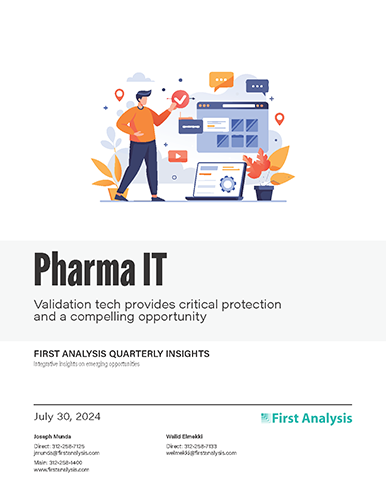Quarterly insights: Pharma IT
Validation tech provides critical protection and a compelling opportunity

The proliferation of new technologies and capabilities in healthcare introduces new risks. How can companies keep error from creeping into big data sets and AI output? How can companies deploy new technologies and capabilities so they interact effectively with legacy systems? Validation processes are an unglamorous but critical key to addressing these challenges.
The FDA mandates critical systems, including software, used in manufacturing, storing and testing products be validated and kept in a validated state throughout their life cycles. Recently, the FDA has been encouraging life science companies to adopt computer system validation (CSV) software that enables a risk-based approach to validating computer systems.
As a result, the market for CSV software is seeing robust growth. We highlight CSV vendors we see making inroads in the market with software solutions that better meet life science companies’ CSV needs.
TABLE OF CONTENTS
- Technology’s benefits come with challenges in making sure it works as intended
- What is validation?
- Computer system validation
- Examples of systems requiring CSV
- The FDA wants companies to use software for more efficient, accurate CSV
- CSV market dynamics
- Competitive landscape
- Another CSV software user base: Outsourced validation service providers
- Another technology tool for building a better healthcare ecosystem
- Pharma IT indexes lose momentum, barely positive in past year
- Pharma IT M&A: Notable transactions include Pro-ficiency and Model N
- Pharma IT private placements: Notable transactions include CRIO and ProofPilot
Technology’s benefits come with challenges in making sure it works as intended
The ongoing digital transformation of the life science industry has created significant opportunities to improve healthcare for patients worldwide. With developments like big data and artificial intelligence (AI), life science companies are now equipped to address complex challenges and bring innovative treatments to market more swiftly. But the proliferation of new technologies and capabilities also introduces new risks. How can companies keep error from creeping into big data sets and AI output? How can companies deploy new technologies and capabilities so they interact effectively with legacy systems across the large, diverse healthcare ecosystem? These are just a few of the challenges that have come with the digital transformation of the life science industry. Validation software is one of the keys to addressing these challenges.
What is validation?
Under FDA regulations that encompass good manufacturing practice (GMP) and related best practices (collectively known as GxP), it is essential to “validate” systems that directly or indirectly affect products and patients before they are used in production environments. These GxP-related systems include quality management systems, electronic document management systems, batch record systems, laboratory information management systems, clinical systems, product safety and compliance reporting systems, environmental monitoring systems, and systems for transferring and analyzing production data. Validation is defined as the collection and evaluation of data that establishes evidence that a process is capable of consistently delivering quality product. Validation is a compliance matter and is the responsibility of life science companies’ quality teams. These teams ensure their organizations remain compliant with regulations, particularly FDA and European Medicines Agency regulations. They are responsible for maintaining data, documentation, and auditability over entire product life cycles, which often span 20 years and sometimes longer. Validation is a specialized field that requires extensive expertise.

Request full report
To access the full report, please provide your contact information in the form below. Thank you for your interest in First Analysis research.
